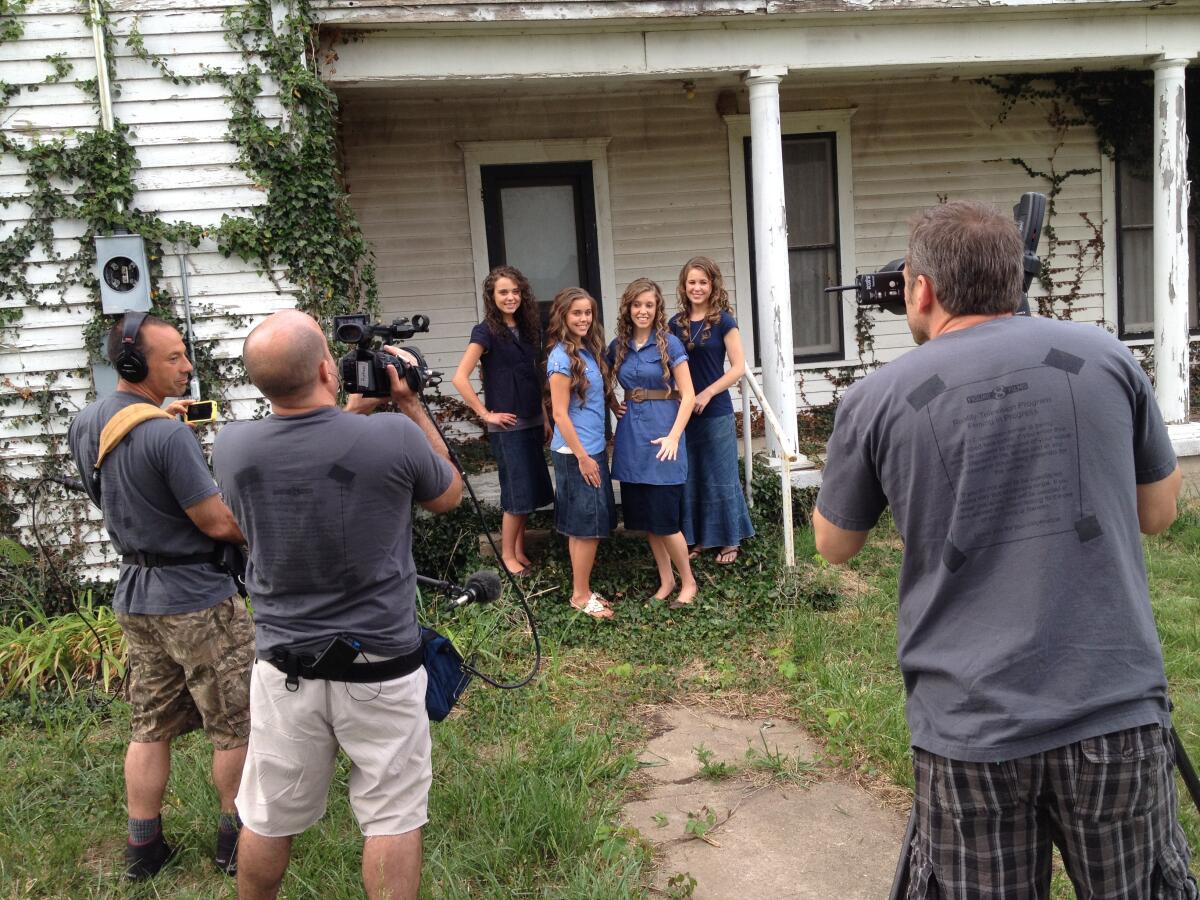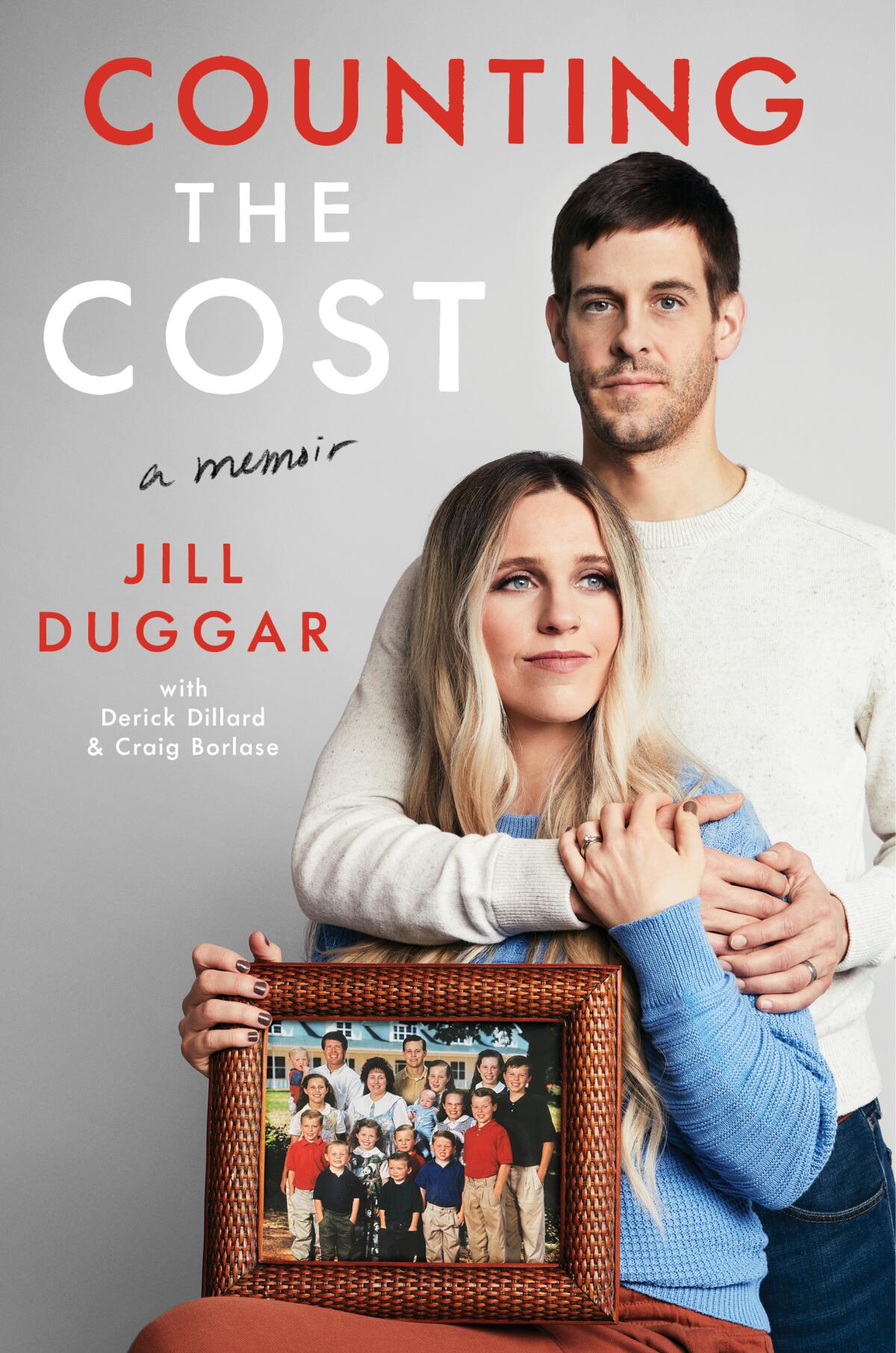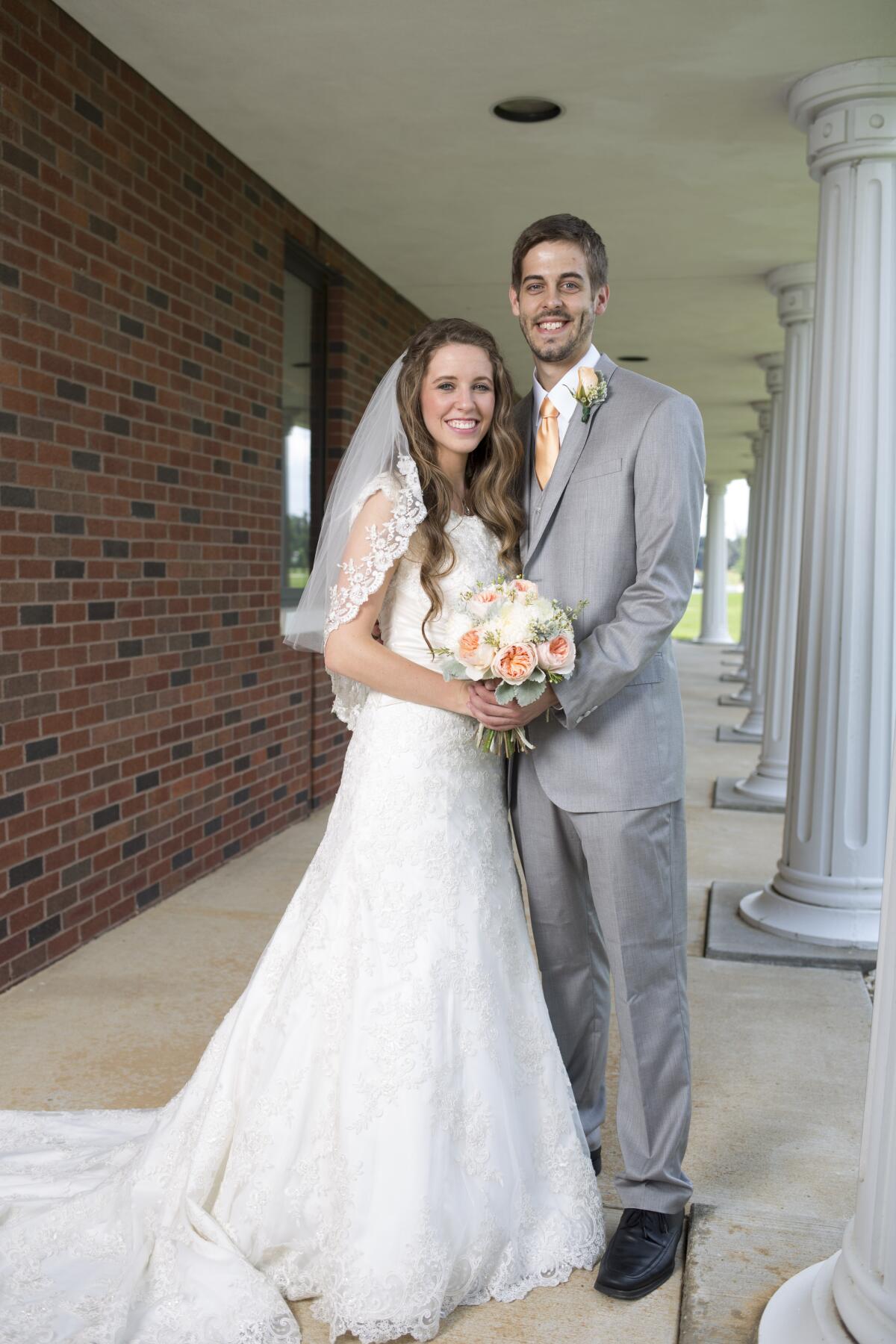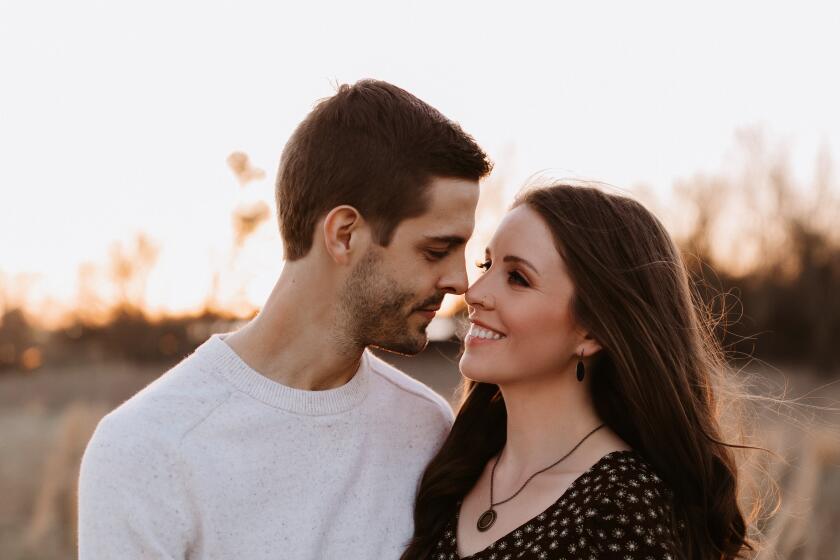Jill Duggar’s family built a wholesome reality TV empire. Now her book talks about its damage

- Share via
Jill Duggar never thought of herself as the rebellious type — quite the opposite.
As the former star of “19 Kids and Counting” writes in her memoir, “Counting the Cost,” “I was hands down the best approval hunter in the whole Duggar family.” As a child raised in a strict Christian Fundamentalist household, she followed rules that forbid “sinful” pursuits like dancing and promoted obedience to paternal authority above all else. Later, when her family’s hit TLC reality show thrust her into the limelight as a teenager, Duggar didn’t question the constant presence of the camera or where all the money from the network was going.
But Duggar became the most visible defector in her famous family with the publication of her book earlier this month. In it, she paints a grim picture of life inside the reality TV bubble, claiming she was tricked by her father, Jim Bob Duggar, into signing a five-year contract that required her to have intimate moments — including the birth of her first child — filmed for public consumption. Even as her father became wealthy enough to amass a fleet of private airplanes and a vast real estate portfolio, she received no money for starring in “19 Kids and Counting” or the spinoff “Counting On” until she waged a painful, protracted legal battle against her parents.
The book paints a damning image of Jim Bob and Michelle Duggar, their finances, and the role that faith played in it all.
Co-written with her husband Derick Dillard and author Craig Borlase, “Counting the Cost” charts Duggar’s spiritual journey away from the rigid beliefs of the Institute in Basic Life Principles, the ministry her parents followed — and which she now describes as a cult.
The book debuted at No. 2 on the New York Times bestseller list, right behind Walter Isaacson’s “Elon Musk,” a sprawling biography of the tech billionaire — an indication not only of the public’s insatiable interest in Duggar family scandal but also of the surprising resonance of religious extremism and reality TV exploitation.
“We’ve been very grateful and thankful for the outpouring of support. So many people have said they’ve been touched by our story, and related to it, even if they didn’t grow up the same way that I did. I’m just grateful to hear that it’s helping people,” said Duggar, in a joint interview with Dillard earlier this month.
The last few weeks have been thrilling — but also nerve-wracking for the couple, who have three boys and live in Oklahoma. “I think we would have been less nervous if we lived further from Northwest Arkansas,” said Dillard, referring to the area where his in-laws still live.
The couple talked about what compelled them to write the book, their family’s reaction to it, and why there needs to be more oversight of children in reality TV. This interview has been edited and condensed for clarity.

What inspired you to write the book in the first place?
Duggar: The last several years we’ve talked about writing a book and struggled with the idea. I was like, “Well, it’s family.” We got more serious about it when I realized the problems that we were facing as a couple are problems that lots of people are facing. The more we talked to friends, we felt like they could relate to our story. They found hope and healing, just knowing that they were not alone in these isolating, controlling, manipulative situations — a lot of it based on the IBLP group that I grew up in. I thought, I can’t sit by anymore and watch people get swept away when there’s something that I can do about it.
On top of that, just thinking about how many years we were on reality TV promoting a lot of these things, you almost feel a responsibility to come back and say, “Hey, this isn’t so rosy. Watch out. Here’s some red flags here that you might want to think about.”
The book revisits a lot of painful chapters in your past, which I’m sure was difficult. With your co-writer, Craig Borlase, did you set guidelines about what you would and wouldn’t discuss in the book?
Duggar: There are parts of my story that I did not want to go into, like the lawsuit my sisters and I were involved in [over the release of police records detailing alleged incidents of sexual abuse that occurred when they were minors]. But I knew that in writing a book, I would have to at least briefly address those areas that nobody should have known about — the abuse and everything that happened. I wanted to address it from a standpoint of “here are the guilty parties, and we’re gonna hold them accountable: the police chief, the city of Springdale, Washington County, and In Touch magazine, the people that released these juvenile records.” I want to be a voice advocating for juvenile victims rights. I didn’t want to feed the frenzy and continue to go into detail.
I think one of the most shocking details in the book is that you felt obligated to share your birth on TV because of this contract that you didn’t even know you had signed and weren’t allowed to read. Looking back, was that the moment you started questioning everything?
Duggar: There were definitely frustrations [before that], but I was very brainwashed into thinking that this is my normal life, I must submit to this. We were conditioned by these principles that I was reared under — the IBLP principles, where you have to honor your parents, but to honor means to obey far into adulthood and marriage. So if my dad says, “I give my blessing for this,” you’re supposed to follow whatever that is. So if that means filming the birth, that’s what we’re supposed to do.
Dillard: Unfortunately, you don’t get away from something like this toxic culture unless you have things blow up in your face. Otherwise, it’s very hard to see it if you’re on the inside. But even from the very beginning, there were red flags.
We wanted our friends to take pictures at our wedding, for example. Our wedding was filmed before 2,000 people and 4.4 million people watched it later on TV, but [at the ceremony] they said, “For the sake of the bride and groom, we ask that you not take pictures. It’s their special day.” And I just cringed, because Jill and I, neither one of us would care if people took pictures. I hated that they used that to promote their own agenda of control and financial gain at our expense. It would sound really weird if they said, “Well, the bride and groom don’t care if you take pictures, but for the sake of the bride’s father, and for the network, TLC, we ask that you not take pictures because they have exclusives.” It wouldn’t sit well in that setting. So they basically lied.

Duggar: We only cared to the degree that we were going to get in trouble from family. I was very conditioned into that. I’ve encouraged other people in similar situations to be patient with each other. That’s a huge thing about coming out of a group like this or any kind of religious cult. I felt equally as uncomfortable [as Derick] about these things, but I was afraid to speak up, because I was so recently removed from it.
A lot of the book is about your relationship with your father and how he exerted control over you when it came to the show. But do you hold the network or producers accountable for any of what happened?
Duggar: I think there was a lot of unknowns on their side. As kids in the lifestyle that we were reared in, we were the perfect victims. We weren’t going to push back a whole lot. We weren’t going to speak up and say no. So when the contract was set before me, they were probably like, “Oh, any normal adult would have read what they were signing.” I don’t know if they were turning a blind eye to signs and symptoms they saw popping up. At the end of the day, they have a show to make. But I think that there should be more accountability in place.
Dillard: Some people didn’t do their due diligence. When we went back and got more documents, there were other signatures that Jill’s parents signed for kids who were not minors at that time. And my opinion is that the network didn’t want to know if there were any issues because they were benefiting so much off of this, and they could deny responsibility if they could claim ignorance. And in my opinion that happened more often than not throughout this whole process.
Do you have thoughts about how the industry can operate more ethically, particularly when it comes to children? Should kids really even be on TV?
Duggar: Having grown up on reality TV, I feel like kids should have more protections in place. I don’t know exactly what that would look like. But I do know that it’s a constant struggle for parents our age, even just trying to figure out what degree to involve your kids on social media. The problem can grow out of hand very quickly when you rely on your children for the show to continue and without them there is no content.
Dillard: There’s [nothing] to make sure kids are protected as far as their education goes. If a family sees an opportunity to make money, they can justify taking away their kids’ time [in school] because, well, they don’t need education, they can just have this money to support them. Jill can attest to this, but from what we can tell, none of her siblings really had much education past the seventh grade. A lot of that was due to the show taking over. It was like, “Well, if the show requires most of the filming hours during the weekday, then school is not really that important.”
Duggar: I can’t say that kids should never be involved in reality TV because I think parents should have a say. But I think networks should have more accountability in place to make sure that kids are being protected, and that they’re getting the education they need, that [the TV show] is not taking priority and that their rights are not being violated. There were very vulnerable moments, like I point out in the book, where I wish I didn’t have to be on reality TV, but I had to.
Do you feel like you or your siblings were deprived of education?
Duggar: Yeah, I do. I went on to take some college classes. I got my midwifery certifications. I’m currently inactive on my status now. But I do think that the show took priority in a lot of areas of our lives. Yes, there were great parts to it. But there were also very difficult parts that I would not choose, if I got to go back and I actually had a choice.
Do you think about where you would be without the show? Obviously, it created a lot of pain for you. But it also helped lead you to where you are now.
Duggar: I definitely wouldn’t have this platform to speak from. At the same time, I’ve had people who have said to me, “Oh, look at all the benefits.” And to them I say, “Look at your life, you have roses and thorns in your life.” And they’re both very valid. Like, I can look back at filming and say, we went on a bunch of great trips, we had some great experiences. But it’s something that I didn’t have a choice in. It was chosen for me.
How are things with your family? Have you heard from them since the book came out?
Duggar: I have heard from some of them. Not a whole lot of feedback, which I didn’t anticipate. I sent my siblings a big long email and just reached out to touch base — at the encouragement of my sister, Jinger, actually. It’s helpful that she just wrote her book in January. Some of [my siblings] were like, “Yeah, I would love to read your book, can you send me a copy?” So I’m getting those to them. And then other ones I haven’t heard from, and I’m fine with that. Because everybody’s in a different place.
I think that’s one thing that therapy has helped me with, is being OK with other people not being OK. It’s hard. I was in tears yesterday about it. It’s not something that you just move past and then you’re callous to it. I love my family. I really do want to have good relationships with them and look toward healing in the future. But it’s a process.
Dillard: Nobody wants bad relationships. We’re really hoping that, you know, 20 years from now we’re going to have genuine healing.
More to Read
The complete guide to home viewing
Get Screen Gab for everything about the TV shows and streaming movies everyone’s talking about.
You may occasionally receive promotional content from the Los Angeles Times.







